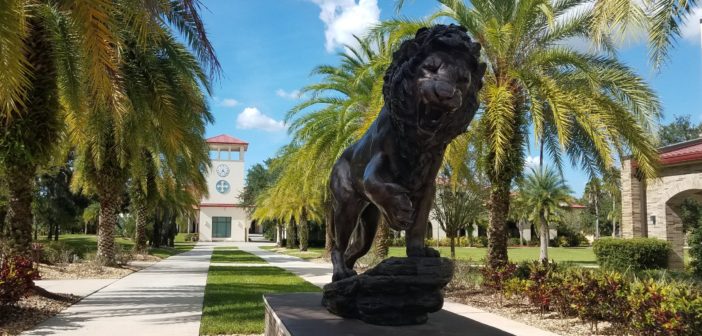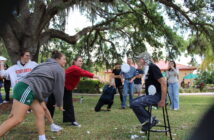By Tayhana Taylor, World News Editor
Saint Leo University’s Honors program is one of the many programs that foster unique learning experiences for students.
In 2020, the new director of the program and associate professor of philosophy, Dr. Timothy Jussaume, started adjusting the program to improve honors students’ experiences inside and outside the classroom.
“Since I took over as the director of the program, we have made tremendous changes like launching a new honors curriculum,” said Jussaume. “The new program officially started in Fall 2021, and the new curriculum focuses on global citizenship.”
As a way of incorporating the theme of global citizenship, there have been new classes introduced to the students in the program.
“I have always loved being in the Honors program,” said Victoria Budnar-Chapman, a senior honors student who is double-majoring in economics and accounting. “The recent changes that Dr. Jussaume has made have only enhanced the program and made it more friendly for the students at Saint Leo University.”
The program’s new theme has enabled honors students to think broader with an international perspective. This allows students to engage in discussion related to new cultures, perspectives, philosophies, and so on.
“My biggest takeaway from being in this new program is that it prepares us students for the real world by discussing current issues and topics,” said Budnar-Chapman. “The theme of global citizenship allows people to think outside of themselves, which will contribute to a more accepting and unified world.”
Ashley Tucker, another honors student, who is a junior majoring in criminal justice and pursuing a double minor in social work and psychology, expresses that she has enjoyed the changes made to the program.
“When I first started the program, the courses were heavy and lacked peer interaction, but with the new changes, I have seen more flexibility, peer interaction, and fun,” said Tucker. “I have gotten to experience phenomenal classes like the HON 360: Hip Hop and Social Justice course taught by Dr. Ebony Perez, department chair of undergraduate social work.”
Over the past two years, the program has become more student-friendly and flexible.
“We are really emphasizing how flexible the program is for our honors students because students can take the honors courses that suit them best,” said Jussaume. “Aside from making changes to the classes, we have been building a community within the honors program that fosters inclusion and builds leadership skills.”
The new honors program gives students opportunities to become leaders and enhance their interpersonal skills through the new student-led activities within the program. One example is allowing students to be a part of the student honors council and become mentors in the new mentorship program.
“We now have a student honors council, and we also have honors events where students can interact outside of the class,” said Jussaume. “It is still a working progress, but we have grown a lot, we now have 100 students, and when the program just started, we had 70 students.”
Although the program has a new direction, many of the adjustments have molded the strengths of the old honors program.
“The current program depicts some of the strengths of the old honors program, in terms of understanding the history of ideas, helping students become more articulate, build their public speaking and communication skills,” said Jussaume.
The honors program now has a diverse group of faculties from various departments teaching classes, and the structure has also been altered.
“In the old program, the classes followed a specific sequence, but this current program allows students to choose the honors courses that work best with their schedules,” said Jussaume. “There are more options for honors courses, and we have done this by increasing the number of faculty teaching in the program.”
One of the main changes to keep the new program interesting is the introduction of new classes each semester.
“We are always working towards creating new and better classes that keep students engaged,” said Jussaume. “I am always excited about revealing the new courses to our students.”
Intending to enroll at least 10 percent of the University’s student population throughout the year, the honors program accepts students who meet the criteria. The academic requirement to be accepted in the program is a 3.5 unweighted GPA and the completion of a supplementary essay.
“We are always looking for students who are willing to experience a different classroom experience and ready to challenge themselves positively,” said Jussaume. “Going forward, the aim is to ensure that each honors class has interactions outside the classroom that connects with lessons being taught inside the classroom.”
Students who are interested in being a part of the differential learning experience the honors program provides can visit https://www.saintleo.edu/honors-program or email timothy.jussaume@saintleo.edu.





